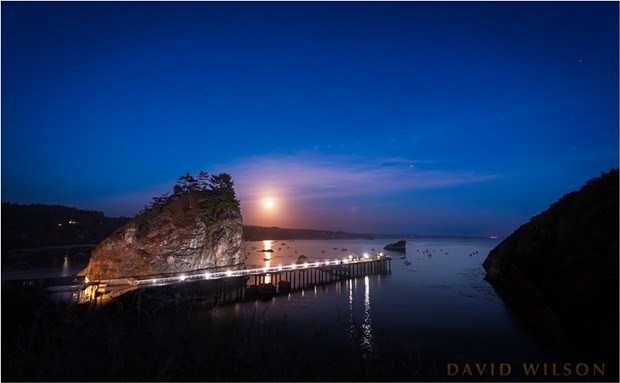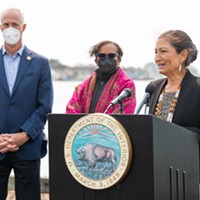Thursday, February 28, 2019
Trinidad Rancheria’s Plans to Put the Harbor into Federal Trust Raise Concerns as Key Hearing Nears
Posted By Elaine Weinreb on Thu, Feb 28, 2019 at 12:40 PM
In January of 2000, the Trinidad Rancheria purchased the rundown pier in the town harbor, along with nine adjacent parcels of commercial land, including a boat launch, bait shop, vacation rental and the Seascape Restaurant from a private owner. With the help of several state and federal grants, the Rancheria replaced the rotting wood pier with a concrete and steel dock. It also replaced the Seascape's septic system, constructed two public restrooms, removed the illegal fish cleaning station at the pier and installed a stormwater capture and treatment system for runoff from the pier, improving the water quality in Trinidad Bay.
The Trinidad Pier is more than just a quaint and picturesque addition to the landscape. It services a fleet of commercial winter crab fishing vessels, as well as numerous year-round commercial and sport businesses. It also contributes heavily to the city's economic base.
The Rancheria, located a half mile south of the city of Trinidad on Scenic Drive, has generally been seen as a good neighbor. In addition to the harbor improvements, it resurfaced a mile of decaying road on Scenic, and has taken on the responsibility of being the designated shelter in the event of an emergency.
But over the past two years, the Rancheria has been doing something that is raising eyebrows in Trinidad. It has petitioned the Bureau of Indian Affairs to place its harbor property into federal trust, which would effectively remove it from the city's jurisdiction.
What does that mean? Right now, the Rancheria owns its harbor property in "fee simple," just like any other homeowner. If you own your own house, you may hold the deed, but you still have to pay property taxes to the city (or county) in which you live and you must adhere to the city's planning and zoning regulations. If you decide to open a factory in a residential neighborhood, you can count on your neighbors complaining and you can count on the city or county denying you the necessary permits.
Federal trust is altogether different. The only oversight agency is the federal government, through the Bureau of Indian Affairs (BIA). The BIA encourages historical Indian reservations to get their lands into trust status, arguing that the tribes are sovereign nations and should not be hampered by state regulations.
The Rancheria's rationale for seeking trust status is puzzling. Unlike the Yurok Tribe or the Hoopa Tribe, the Trinidad Rancheria was created in 1906 as a refuge for displaced Indians of many different tribes, including Yurok, Wiyot, Tolowa, Chetco, Karuk and Hupa people. The Rancheria was endowed with 60 acres on the bluffs along Scenic Drive, for that specific purpose. The Rancheria says that by placing the harbor into trust, it will regain ancestral lands. But to literally do this, they would have to reclaim a good chunk of northwestern California. And the harbor does not have any direct historical tie to the Rancheria, other than the land purchased less than 20 years ago. The Rancheria plans to construct a visitor's center on the property but it could do that just as well under fee simple.
This has many people wondering — both Trinidad residents and state agencies — why the Rancheria wants to sidestep state and local regulation on a potentially lucrative piece of real estate. The questioners include many Native American people who are not affiliated with the Rancheria.
"The Yurok Tribe maintains a standing objection to the Bureau of Indian Affairs and the U.S. Department of the Interior taking into trust any land for Trinidad Rancheria, or any other Tribe, within Yurok Ancestral Territory," states a letter written by Yurok Tribal Chair Thomas P. O'Rourke, Sr., to the BIA on April 17, 2017. "All of the parcels in the Rancheria's fee-to-Trust application are located outside of Trinidad Rancheria and within the exterior boundaries of Yurok Ancestral Territory, defined by the Yurok Constitution and federal case law."
The letter continues: "The parcels ... contain areas of cultural significance to the Yurok Tribe. The area in question is within the Yurok Village of T'Suri. ... It is the responsibility of the Yurok to ... protect the many documented archaeological and culturally significant sites located within the Yurok Ancestral Territory. ... Among concerns that this fee-to-trust application bring up include viewshed concerns, Yurok family Village rights, Tribal rights and more."
O'Rourke referred the BIA to the tribe's general counsel, implying that legal action could be considered.
The Trinidad Pier is more than just a quaint and picturesque addition to the landscape. It services a fleet of commercial winter crab fishing vessels, as well as numerous year-round commercial and sport businesses. It also contributes heavily to the city's economic base.
The Rancheria, located a half mile south of the city of Trinidad on Scenic Drive, has generally been seen as a good neighbor. In addition to the harbor improvements, it resurfaced a mile of decaying road on Scenic, and has taken on the responsibility of being the designated shelter in the event of an emergency.
But over the past two years, the Rancheria has been doing something that is raising eyebrows in Trinidad. It has petitioned the Bureau of Indian Affairs to place its harbor property into federal trust, which would effectively remove it from the city's jurisdiction.
What does that mean? Right now, the Rancheria owns its harbor property in "fee simple," just like any other homeowner. If you own your own house, you may hold the deed, but you still have to pay property taxes to the city (or county) in which you live and you must adhere to the city's planning and zoning regulations. If you decide to open a factory in a residential neighborhood, you can count on your neighbors complaining and you can count on the city or county denying you the necessary permits.
Federal trust is altogether different. The only oversight agency is the federal government, through the Bureau of Indian Affairs (BIA). The BIA encourages historical Indian reservations to get their lands into trust status, arguing that the tribes are sovereign nations and should not be hampered by state regulations.
The Rancheria's rationale for seeking trust status is puzzling. Unlike the Yurok Tribe or the Hoopa Tribe, the Trinidad Rancheria was created in 1906 as a refuge for displaced Indians of many different tribes, including Yurok, Wiyot, Tolowa, Chetco, Karuk and Hupa people. The Rancheria was endowed with 60 acres on the bluffs along Scenic Drive, for that specific purpose. The Rancheria says that by placing the harbor into trust, it will regain ancestral lands. But to literally do this, they would have to reclaim a good chunk of northwestern California. And the harbor does not have any direct historical tie to the Rancheria, other than the land purchased less than 20 years ago. The Rancheria plans to construct a visitor's center on the property but it could do that just as well under fee simple.
This has many people wondering — both Trinidad residents and state agencies — why the Rancheria wants to sidestep state and local regulation on a potentially lucrative piece of real estate. The questioners include many Native American people who are not affiliated with the Rancheria.
"The Yurok Tribe maintains a standing objection to the Bureau of Indian Affairs and the U.S. Department of the Interior taking into trust any land for Trinidad Rancheria, or any other Tribe, within Yurok Ancestral Territory," states a letter written by Yurok Tribal Chair Thomas P. O'Rourke, Sr., to the BIA on April 17, 2017. "All of the parcels in the Rancheria's fee-to-Trust application are located outside of Trinidad Rancheria and within the exterior boundaries of Yurok Ancestral Territory, defined by the Yurok Constitution and federal case law."
The letter continues: "The parcels ... contain areas of cultural significance to the Yurok Tribe. The area in question is within the Yurok Village of T'Suri. ... It is the responsibility of the Yurok to ... protect the many documented archaeological and culturally significant sites located within the Yurok Ancestral Territory. ... Among concerns that this fee-to-trust application bring up include viewshed concerns, Yurok family Village rights, Tribal rights and more."
O'Rourke referred the BIA to the tribe's general counsel, implying that legal action could be considered.
Speaking of...
Comments (2)
Showing 1-2 of 2
Readers also liked…
more from the author
-
Trouble on the Mountain
A popular outdoor recreation area is also a makeshift shooting range, causing growing safety concerns
- Jan 11, 2024
- More »



































